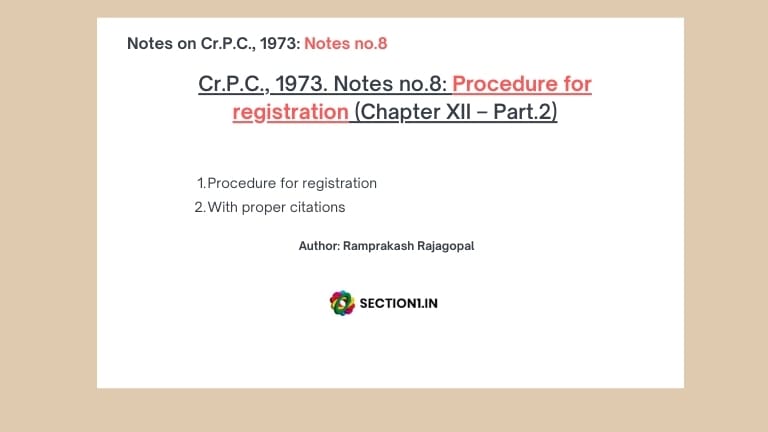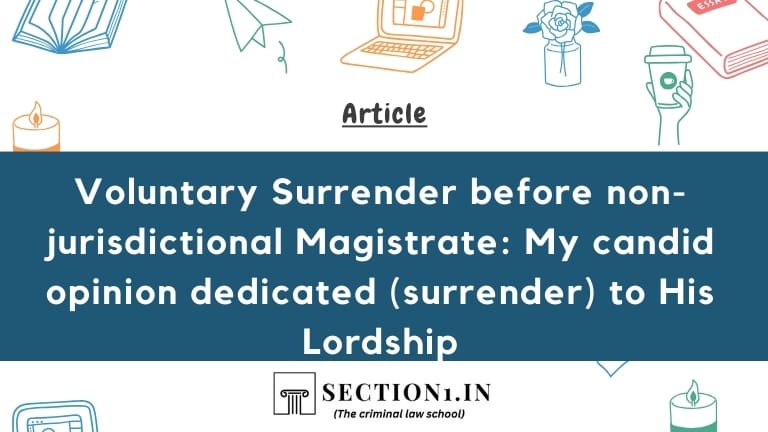Chapter. XII – PART. 2 – PROCEDURE FOR REGISTRATION
First information report – Procedure for registration
- Every information relating to commission of cognizable offence,
- Given to the officer in-charge of a police station 2(o)[1]P.C,
- At the instance of an informant,
- Shall be reduced into writing or under his (informant) direction, and read over to the informant,
- Shall be signed by the person giving it (and)
- The substance thereof shall be entered in a book prescribed by the state government in this behalf,
- If information given by the woman, then such information shall be recorded by a woman police officer or any “woman officer”.
- Section 154(2) says that a copy of the information shall be given to forthwith, free of cost, to the informant.
- Section 154(3) stipulates that in the event of a refusal on part of an officer- in-charge of a police station to record such information, it may be sent in writing and by post to the Superintendent of Police who will direct investigation into the same.
[Naman Singh A Naman Pratap Singh and anr vs. State of U.P – Criminal Appeal No. 1620 of 2018 – DECEMBER 13, 2018 – 2019(1) MWN (crl) 192 (SC)].
First information report – Duty of the SHO – Genuineness of the f.i.r need not be looked into
Genuineness or otherwise of the information can only be considered after registration of the case. Genuineness of credibility of the information is not a condition precedent for registration of a case [Ramesh Kumari vs. State (N.C.T of Delhi) and others – 2006(1) CTC 666 (SC)].
First information report – Economic offences/commercial offences – Subsequent complaints are s. 161 cr.p.c statement – Multiple firs on same incident
From a reading of the above, even in case of a single depositor, if the Financial Establishment fails to return the deposit amount or fails to pay the interest on the deposit amount, an FIR can be launched and investigation taken up. If this court is to accept the plea of the State that the complainant, deposit receipts and amounts differ and therefore, there is no sameness in the complaint of new depositors, then it would led to a very disastrous situation, whereby thousands of FIRs will stand registered and each time when the arrested accused is released on bail in one FIR, he can be re- arrested and kept in jail for the whole of his life time as a remanded prisoner. A common-sense approach should be adopted and a pragmatic interpretation of the law would be made. A similar situation arose before this court in V.Ettiappan & Ors vs. S.P wherein 600 people were cheated by a person and this court directed that, there can be one FIR and the complaints of other persons should be treated as statement u/s161(3) Cr.P.C [Viswapriya (India) Ltd vs. Government of Tamil Nadu – (2015) 3 MLJ (Crl) 385].
FIR – not necessary in the hand writing of informant:
There is also no requirement that the FIR must be in the handwriting of the informant [Himanshu Mohan Rai Versus State of U.P. & Another – Criminal Appeal Nos. 827 of 2011, 829 of 2011 – dt: 07-03-2017].
First information report – Registration against police officials
Thus, the complaint is about the commission of cognizable offences. If so, even when the information is against the police officials, including the Sub-Inspector’s own higher officials it is the duty of the officer in-charge of the police station viz, the above said S.I, Harur, to register the case, in other words he should have reduced the above said information to writing read it over to the informant, get their signatures to it and enter the substances thereof in the ‘A’ Diary kept in the police station and also gave the information so recorded free of cost to the informants. No police standing order prevents him from doing so. Police standing order 145 only deals with investigation and not with registering the case as stated above [A.Nallasivan v. State of T.N – 1995 Cr.L.J 2754 (Mad)].
FIR – preliminary inquiry before registering fir
The question whether u/s 154 Cr.P.C, a police officer is bound to register an FIR when a cognizable offence is made out or he has some latitude of conducting some kind of preliminary enquiry before registering the FIR raised in Lalita Kumari v Govt of U.P [2012 (2) Supreme 321 – Part 36]. It was contended as follows:
-
Whenever informant regarding cognizable offence is brought to the notice of SHO, he has no option but to register the FIR and if it is not done direction to register the same can be given [Aleque Padamse v. U.O.I – (2007)6 SCC 171 (3 Judges Bench)].
-
The provision of section 154 (1) Cr.P.C read in light of statutory scheme do not admit of conferring any discretion on the officer in charge of the police station of embarking upon an preliminary enquiry prior to registration of an FIR. A ‘preliminary enquiry’ is a term which is alien to the Cr.P.C, 1973 which talks of
-
Investigation, 2. Inquiry and 3. Trial. These terms are definite connotation having been defined u/s 2 of the Cr.P.C.
-
On the other hand, Supreme Court following previous cases [Rajinder Singh Kotcha – 2007 (10) SCC 69; P.Sirajuddin – 1970 (1) SCC 595; Bhagwant Kishore Joshi – AIR 1964 SC 221; Selvi – 1981 (supp) SCC 43] and held that before registering the FIR u/s 154 Cr.P.C, it is open to the SHO to hold a preliminary enquiry to ascertain whether there is a prima facie of commission of cognizable offence or not.
Finally, Supreme Court in the above said case refer the matter to a Constitution Bench of at least five Judges for an authoritative judgment.
After the constitution of Five Judges Bench, the Apex Court in Lalita Kumari vs. Govt. of U.P. and Ors dated: 12.11.2013 – SC – (2014) 2 SCC 1 [constitution bench 5 judges] through the lead the Chief Justice has answered the following:
- Registration of FIR is mandatory under Section 154 of the Code, if the information discloses commission of a cognizable offence and no preliminary inquiry is permissible in such a situation.
- If the information received does not disclose a cognizable offence but indicates the necessity for an inquiry, a preliminary inquiry may be conducted only to ascertain whether cognizable offence is disclosed or not.
- If the inquiry discloses the commission of a cognizable offence, the FIR must be registered. In cases where preliminary inquiry ends in closing the complaint, a copy of the entry of such closure must be supplied to the first informant forthwith and not later than one week. It must disclose reasons in brief for closing the complaint and not proceeding further.
- The police officer cannot avoid his duty of registering offence if cognizable offence is Action must be taken against erring officers who do not register the FIR if information received by him discloses a cognizable offence.
- The scope of preliminary inquiry is not to verify the veracity or otherwise of the information received but only to ascertain whether the information reveals any cognizable offence.
- As to what type and in which cases preliminary inquiry is to be conducted will depend on the facts and circumstances of each The category of cases in which preliminary inquiry may be made are as under:
-
Matrimonial disputes/ family disputes
-
Commercial offences
-
Medical negligence cases
-
Corruption cases
-
Cases where there is abnormal delay/laches in initiating criminal prosecution, for example, over 3 months delay in reporting the matter without satisfactorily explaining the reasons for delay. The aforesaid are only illustrations and not exhaustive of all conditions which may warrant preliminary inquiry.
- While ensuring and protecting the rights of the accused and the complainant, a preliminary inquiry should be made time bound and in any case it should not exceed 7 days. The fact of such delay and the causes of it must be reflected in the General Diary entry.
- Since the General Diary/Station Diary/Daily Diary is the record of all information received in a police station, we direct that all information relating to cognizable offences, whether resulting in registration of FIR or leading to an inquiry, must be mandatorily and meticulously reflected in the said Diary and the decision to conduct a preliminary inquiry must also be reflected, as mentioned above.
FIR – ‘limited inquiry’ before registration of fir
It is further made clear that if the facts are such which require some inquiry for the satisfaction about the charges or allegations made in the FIR then such a ‘limited inquiry’ is permissible. [Doliben Kantilal Patel vs. State of Gujarat & another – (2014) 1 SCC (Cri) 218=(2013) 9 SCC 447=2013 (7) SCALE 794=(2013) 9 SCC 447=AIR 2013 SC 2640].
Procedure when police officer refuses to register f.i.r
-
If an information disclosing a cognizable offence is laid before a police officer satisfying the requirements of 154 (1) Cr.P.C, the said police officer has no other option except to register a case on the basis of such information and investigate [AIR 1992 SC 604 State of Haryana vs. Bhajanjlal; 2006 (1) SCC (Crl) 678; Ramesh Kumari vs. State (NCT of Delhi); 2007 (1) MLJ (Crl) 315 susadima amarolpam vs. D.G.P].
-
If a person has a grievance that his F.I.R has not been registered by the police station his first remedy is to approach the Superintendent of Police u/s. 154 (1) Cr.P.C or other police officer referred to in 36. If despite approaching the S.P or the officer referred to in S. 36 his grievance still persists, then he can approach a Magistrate u/s. 156(3) Cr.P.C instead of rushing to the High Court by way of a writ petition or a petition u/s. 482 Cr.P.C. Moreover, he has a further remedy of filing a Criminal complaint u/s. 200 Cr.P.C [(2007) 6 SCC 171 Aleque Padamsee vs. U.O.I; (2008) 2 SCC 409 (Sakiri vasu vs. State of U.P & ors].
-
High court cannot exercise its jurisdiction u/s. 482 Cr.P.C directing the authorities to register the case, investigate and file a final report, but the aggrieved person is to approach the Higher Official or the Learned Magistrate [(2011)1 TLNJ 181 [His Lordship Mr. Justice. G.M.Akbar Ali] A.M.Mohan vs. D.G.P].
First information report – Whether accused can lodge fir?
Where the first information report is given by an accused himself to a police officer and amounts to a confessional statement, proof of the confession is prohibited by section 25 of the Evidence Act. No part of the confessional statement can be proved or received in evidence, except to the extent it is permitted by section 27 of the Evidence Act. The first information report recorded u/s. 154 Cr.P.C is not a substantive piece of evidence. It may be used to corroborate the informant u/s. 157 of the Evidence Act or to contradict him u/s 145 of the Evidence Actin case the informant appears as a witness at the trial. Where the accused himself lodges the first information report, the fact of his giving the information to the police is admissible against him as evidence of his conduct u/s 8 of the Evidence Act and to the extent it is non-confessional in nature, it would also be relevant u/s. 21 of the Evidence Act but the confessional part of the first information report by the accused to the police officer cannot be used at all against him in view of the ban of section 25 of the Evidence Act [Bheru Singh, s/o Kalyan Singh vs. State of Rajasthan – (1994)1 SCALE 353=(1994)2 SCC 467=(1994)1 Crimes 630 (SC)=1994 SCC (Cri) 555=1995 AIR SCW 2126].
First information report – Copy of fir shall be uploaded in the government website
Having heard learned Counsel for the parties, we think it appropriate to record the requisite conclusions and, thereafter, proceed to issue the directions:
- An accused is entitled to get a copy of the First Information Report at an earlier stage than as prescribed Under Section 207 of the Code of Criminal Procedure.
- An accused who has reasons to suspect that he has been roped in a criminal case and his name may be finding place in a First Information Report can submit an application through his representative/agent/parokar for grant of a certified copy before the concerned police officer or to the Superintendent of Police on payment of such fee which is payable for obtaining such a copy from the Court. On such application being made, the copy shall be supplied within twenty-four hours.
- Once the First Information Report is forwarded by the police station to the concerned Magistrate or any Special Judge, on an application being filed for certified copy on behalf of the accused, the same shall be given by the Court concerned within two working days. The aforesaid direction has nothing to do with the statutory mandate inhered Under Section 207 of the Code of Criminal Procedure.
- The copies of the F.I.R.s., unless the offence is sensitive in nature, like sexual offences, offences pertaining to insurgency, terrorism and of that category, offences under POCSO Act and such other offences, should be uploaded on the police website, and if there is no such website, on the official website of the State Government, within twenty-four hours of the registration of the First Information Report so that the accused or any person connected with the same can download the FIR and file appropriate application before the Court as per law for redressal of his grievances. It may be clarified here that in case there is connectivity problems due to geographical location or there is some other unavoidable difficulty, the time can be extended up to forty-eight hours. The said 48 hours can be extended maximum up to 72 hours and it is only relatable to connectivity problems due to geographical location.
- The decision not to upload the copy of the F.I.R. on the website shall not be taken by an officer below the rank of Deputy Superintendent of Police or any person holding equivalent post. In case, the States where District Magistrate has a role, he may also assume the said authority. A decision taken by the concerned police officer or the District Magistrate shall be duly communicated to the concerned jurisdictional Magistrate.
- The word ‘sensitive’ apart from the other aspects which may be thought of being sensitive by the competent authority as stated hereinbefore would also include concept of privacy regard being had to the nature of the F.I.R. The examples given with regard to the sensitive cases are absolutely illustrative and are not exhaustive.
- If an FIR is not uploaded, needless to say, it shall not ensure perse a ground to obtain the benefit Under Section 438 of the Code of Criminal Procedure.
- In case a copy of the F.I.R. is not provided on the ground of sensitive nature of the case, a person grieved by the said action, after disclosing his identity, can submit a representation to the Superintendent of Police or any person holding the equivalent post in the State. The Superintendent of Police shall constitute a committee of three officers which shall deal with the said grievance. As far as the Metropolitan cities are concerned, where Commissioner is there, if a representation is submitted to the Commissioner of Police who shall constitute a committee of three officers. The committee so constituted shall deal with the grievance within three days from the date of receipt of the representation and communicate it to the grieved person.
- The competent authority referred to hereinabove shall constitute the committee, as directed herein-above, within eight weeks from today.
- In cases wherein decisions have been taken not to give copies of the FIR regard being had to the sensitive nature of the case, it will be open to the accused/his authorized representative/parokar to file an application for grant of certified copy before the Court to which the F.I.R. has been sent and the same shall be provided in quite promptitude by the concerned Court not beyond three days of the submission of the application.
- The directions for uploading of F.I.R. in the website of all the States shall be given effect from 15th November, 2016.
[Youth Bar Association of India vs. Union of India (UOI) dt: 07.09.2016 – SC – AIR 2016 SC 4136].
Further study
Cr.P.C., 1973. Notes no.2: A General Introduction (with powers of police)
Cr.P.C., 1973. Notes no.3: General Provisions as to Inquiries and Trials – Part.1
Cr.P.C., 1973. Notes no.4: General Provisions as to Inquiries and Trials – Part.2 (Duty of judge)
Police may summon parties during preliminary inquiry
Powers of magistrate u/s 156(3) direction
section 188 IPC – Registering FIR & investigation procedure explained
Affidavit: Court cannot convert complaint into a 156(3) cr.p.c petition without following procedures
[1] “Officer-in-charge of a police station” includes, when the officer-in-charge of the police station is absent from the station-house or unable from illness or other cause to perform his duties, the police officer present at the station-house who is next in rank to such officer and is above the rank of a constable or, when the State Government so directs, any other police officer so present;






